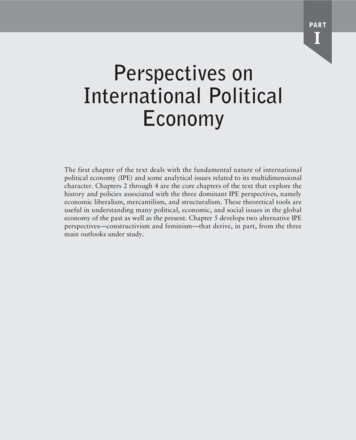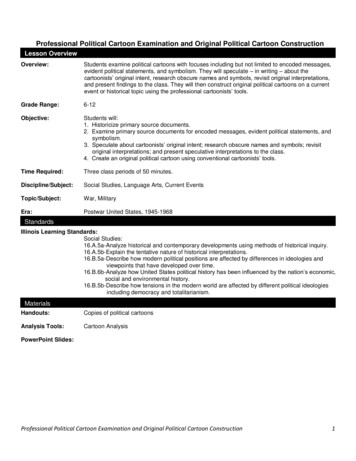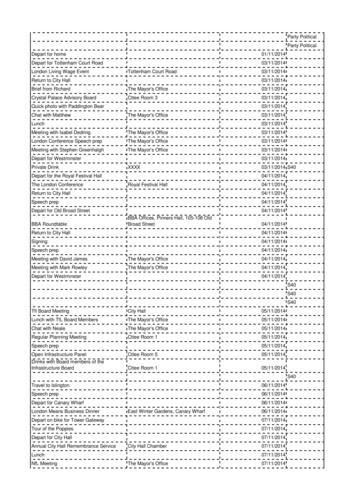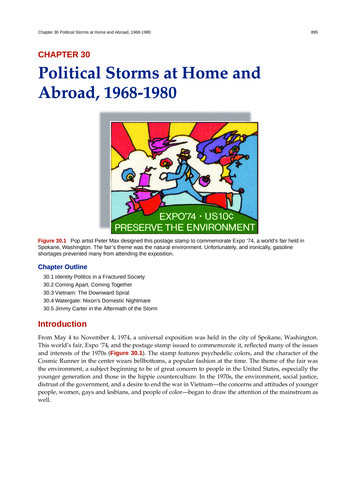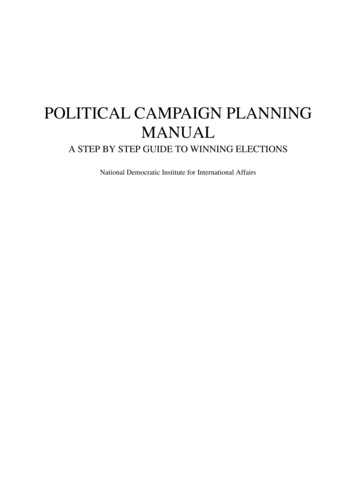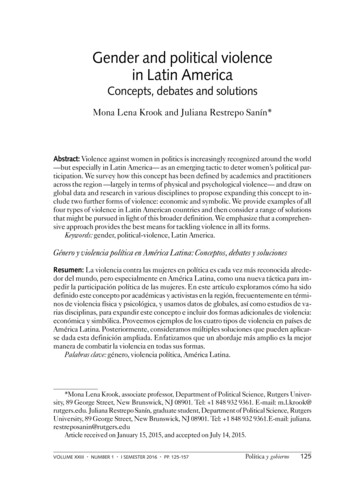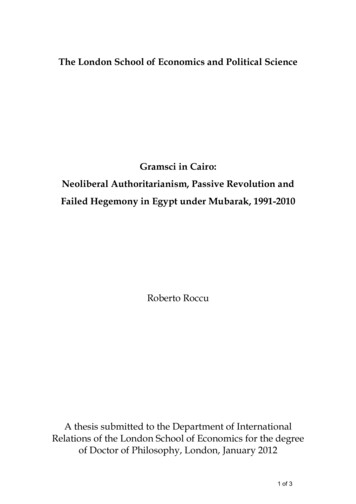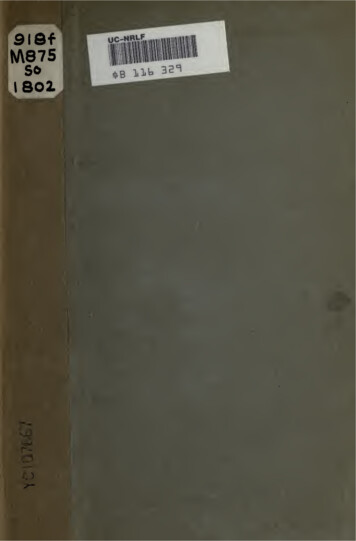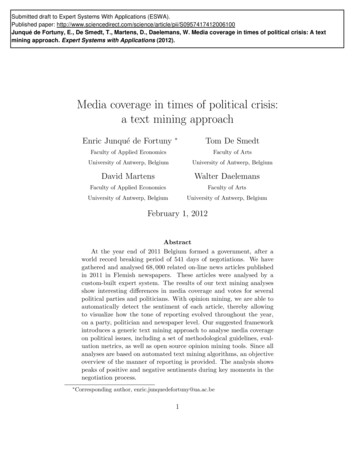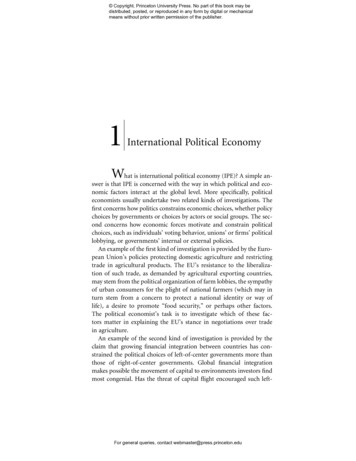
Transcription
Copyright, Princeton University Press. No part of this book may bedistributed, posted, or reproduced in any form by digital or mechanicalmeans without prior written permission of the publisher.1International Political EconomyWhat is international political economy (IPE)? A simple an swer is that IPE is concerned with the way in which political and eco nomic factors interact at the global level. More specifically, politicaleconomists usually undertake two related kinds of investigations. Thefirst concerns how politics constrains economic choices, whether policychoices by governments or choices by actors or social groups. The sec ond concerns how economic forces motivate and constrain politicalchoices, such as individuals’ voting behavior, unions’ or firms’ politicallobbying, or governments’ internal or external policies.An example of the first kind of investigation is provided by the Euro pean Union’s policies protecting domestic agriculture and restrictingtrade in agricultural products. The EU’s resistance to the liberaliza tion of such trade, as demanded by agricultural exporting countries,may stem from the political organization of farm lobbies, the sympathyof urban consumers for the plight of national farmers (which may inturn stem from a concern to protect a national identity or way oflife), a desire to promote “food security,” or perhaps other factors.The political economist’s task is to investigate which of these fac tors matter in explaining the EU’s stance in negotiations over tradein agriculture.An example of the second kind of investigation is provided by theclaim that growing financial integration between countries has con strained the political choices of left-of-center governments more thanthose of right-of-center governments. Global financial integrationmakes possible the movement of capital to environments investors findmost congenial. Has the threat of capital flight encouraged such left For general queries, contact webmaster@press.princeton.edu
Copyright, Princeton University Press. No part of this book may bedistributed, posted, or reproduced in any form by digital or mechanicalmeans without prior written permission of the publisher.2CHAPTER 1of-center politicians as Brazil’s President Lula (Luiz Inácio da Silva) andBritain’s Gordon Brown to adopt “conservative” economic policies toreassure panicky investors? Manifestations of this phenomenon mightinclude political pledges to pursue fiscal balance, to limit or reducetaxes on capital, and to place responsibility for monetary policy in thehands of politically independent and conservative central bankers. Dofinancial markets systematically punish left-wing financial policies?Is the asserted shift in policy by leftist political figures a myth? If it isreal, is it due to some factor other than capital mobility? These havebeen popular questions for political economists in recent years (seechapter 5).As we shall see, asking how politics and economics interact makesgood sense. Economic outcomes have political implications becausethey affect opinions and power. For example, where individuals orgroups fall in the hierarchy of wealth influences their political prefer ences. Similarly, decisions about economic policies are almost invari ably politicized because different choices have different effects on thedistribution of wealth. Political power is therefore a means by whichindividuals or groups can alter the production and distribution ofwealth, and wealth is a means of achieving political influence. Althoughthe pursuit of wealth is not the only motivating factor in human behav ior, it is an important one, and often the means by which other goalscan be achieved. In short, economic and political factors interact todetermine who gets what in society.In light of the preceding comments, one would be forgiven for as suming that the academic subjects of economics and political sciencewere nearly indistinguishable. Although they indeed were aligned formany decades, new boundaries between the emerging academic disci plines of economics and political science in the early twentieth centuryled to distinct research questions, methods, and empirical focus. Fur thermore, as we explain later, cross-disciplinary dialogue was mutedbecause IPE grew out of international relations and because its found ing scholars saw it as a response to irredeemable flaws in the disciplineof economics.We argue that IPE should move on—and indeed for the most partit has—from this early position of hostility to international economics.Most observers accept that contemporary students of political economyneed more understanding of economic concepts than was initiallyFor general queries, contact webmaster@press.princeton.edu
Copyright, Princeton University Press. No part of this book may bedistributed, posted, or reproduced in any form by digital or mechanicalmeans without prior written permission of the publisher.INTERNATIONAL POLITICAL ECONOMYthought necessary. As the purposes of studying political economyevolve, so too does appropriate methodology. Today, when so many IPEscholars plunder economics for testable theories of political economy,some ask whether the pendulum has swung too far in that direction.We cannot answer this question without a clear sense of both the bene fits and the costs of close engagement between economics, political sci ence, and international relations. Hence our argument for an IPE thatengages fully but critically with economic theory and method.ECONOMICS AND POLITICAL ECONOMYAlthough most scholars in our subject could agree with the generaldefinition of political economy offered at the beginning of this chapter,students coming to the subject for the first time may be confused bythe plethora of approaches to the field, which include, among others,formal political economy within the neoclassical economic tradition,1Marxist or neo-Marxist historical sociology,2 mainstream political sci ences,3 and offshoots of international relations.4 These different orien tations have soft boundaries, and authors often straddle one or moreof them. The intellectual antecedents of modern approaches go backto the mercantilist thinkers of early modern Europe and to strands ofEnlightenment thought.51James E. Alt and K. Alec Chrystal, Political Economics (Berkeley and Los Angeles: Universityof California Press, 1983); Gary S. Becker, “A Theory of Competition among Pressure Groups forPolitical Influence,” Quarterly Journal of Economics 98:3, 1983, 371–400; James M. Buchanan,“The Constitution of Economic Policy,” American Economic Review 77:3, 1987, 243–50; AllenDrazen, Political Economy in Macroeconomics (Princeton, N.J.: Princeton University Press, 2002);Bruno S. Frey, International Political Economics (Oxford: Blackwell, 1984).2Fred H. Block, The Origins of the International Economic Disorder (Berkeley and Los Angeles:University of California Press, 1977); Robert W. Cox, Power, Production, and World Order: SocialForces in the Making of History (New York: Columbia University Press, 1987).3Geoffrey Garrett, Partisan Politics in the Global Economy (Cambridge: Cambridge UniversityPress, 1998); Robert O. Keohane and Helen V. Milner, eds., Internationalization and DomesticPolitics (Cambridge: Cambridge University Press, 1996).4Robert Gilpin, War and Change in World Politics (Cambridge: Cambridge University Press,1981); Stephen D. Krasner, “State Power and the Structure of International Trade,” World Politics28:3, 1976, 317–47; Susan Strange, States and Markets (London: Pinter, 1988).5Peter Groenewegen, “‘Political Economy’ and ‘Economics,’ ” in John Eatwell, Murray Milgate,and Peter Newman, eds., The New Palgrave: The World of Economics (London: Macmillan, 1991),556–62.For general queries, contact webmaster@press.princeton.edu3
Copyright, Princeton University Press. No part of this book may bedistributed, posted, or reproduced in any form by digital or mechanicalmeans without prior written permission of the publisher.4CHAPTER 1In our view, political economy is not any particular approach ortradition but an attitude to social science that does not privilege anysingle category of variable, whether political or economic. In this way,it harks back to a pre-twentieth-century tradition of political economy,in which thinkers as different as Adam Smith and Karl Marx under stood that governments made economic policy in a political contextand that economic outcomes had political and social implications.As political economy developed over the course of the nineteenthcentury and as the modern subject of economics took shape, economicsand political economy diverged. By the mid-twentieth century, mosteconomists asked questions quite different from those political econo mists were asking. A central concern of economists has been to devel op theoretical arguments about the relative optimality of differentpublic policies. For example, economists often claim that one of thecrowning achievements of their subject is the theory of comparativeadvantage, which holds that free trade policies generally maximize na tional and global (economic) welfare. Although many political econo mists have disputed this claim, the scholarly territory of optimal eco nomic policy is not one where political economy has, so to speak, acomparative advantage.Political economists more often ask what factors explain actual policyoutcomes. Even when there is a consensus on the best policies (such ason the optimality of free trade), actual policies vary across countriesand often diverge from economists’ prescriptions. Why do most coun tries ignore economists and raise barriers to trade, and why do levelsof protection vary across countries and sectors? These are classic ques tions of political economy. Indeed, the gap between standard economicprescription and the reality of trade policy is so large that most text books on international economics include sections on the politicaleconomy of trade policy (although new developments in the theory ofstrategic trade policy have opened new debates about the theoreticalsuperiority of free trade). In a range of areas, policies that are bad fromthe perspective of economic welfare can make good politics, openingup space for explorations in political economy.Moreover, as Kirshner has pointed out, in most areas economics gen erally has not reached a consensus on the relative optimality of particu For general queries, contact webmaster@press.princeton.edu
Copyright, Princeton University Press. No part of this book may bedistributed, posted, or reproduced in any form by digital or mechanicalmeans without prior written permission of the publisher.INTERNATIONAL POLITICAL ECONOMYlar policies.6 Once again, this means that explanations of actual eco nomic policy outcomes must turn to other factors, especially politicalvariables. For example, there is little consensus in economics regardingthe net benefits of financial openness, especially for developing coun tries, but in practice countries have widely varying patterns of financialopenness. The position is similar with respect to policies in areas suchas exchange rates, labor markets, welfare, education and training, cor porate governance, and accounting regulation, to name but a few. Evenin areas where there is a broad consensus among economists, such asthe optimality of politically independent central banks, the empiricalevidence in favor of the policy can be quite weak.7 Hence, it seems thatin a range of areas, factors other than empirically validated economictheory explain actual choices among policies.One important strand of political economy explains such choicesusing the language and methods of neoclassical economics. This strandis often called positive political economy in reference to its relative lackof concern with normative questions and its use of deductive theoriesand rigorous empirical methods to explain outcomes.8 With respectto one of the issues we have mentioned—the question of why manydeveloped countries protect domestic agriculture—positive politicaleconomy answers that the beneficiaries of such policies (farmers) arebetter organized and more politically influential than the consumers offood.9 Other economists have analyzed how different kinds of politicalinstitutions can affect choices on economic policy.106Jonathan Kirshner, “The Study of Money,” World Politics 52:3, 2000, 407–36; Jonathan Kir shner, ed., Monetary Orders: Ambiguous Economics, Ubiquitous Politics (Ithaca, N.Y.: Cornell Uni versity Press, 2003).7Ilene Grabel, “Ideology, Power, and the Rise of Independent Monetary Institutions in Emerg ing Economies,” in Kirshner, Monetary Orders, 25–54.8James E. Alt and Kenneth A. Shepsle, eds., Perspectives on Positive Political Economy (Cam bridge: Cambridge University Press, 1990).9Becker’s “Theory of Competition among Pressure Groups” provides the classic statement ofthis approach. It is notable that a number of prominent Nobel prize-winners in economics, in cluding Becker, have been centrally concerned with questions of political economy. See James E.Alt, Margaret Levi, and Elenor Ostrom, Competition and Cooperation: Conversations with Nobelistsabout Economics and Political Science (New York: Russell Sage Foundation, 1999).10James M. Buchanan and Gordon Tullock, The Calculus of Consent: Logical Foundations ofConstitutional Democracy (Ann Arbor: University of Michigan Press, 1962); Mancur Olson, Powerand Prosperity: Outgrowing Communist and Capitalist Dictatorships (New York: Basic Books, 2000).For general queries, contact webmaster@press.princeton.edu5
Copyright, Princeton University Press. No part of this book may bedistributed, posted, or reproduced in any form by digital or mechanicalmeans without prior written permission of the publisher.6CHAPTER 1Building on this tradition of positive political economy within eco nomics, a number of political scientists, mainly in the United States,have also employed economic theory to explain broad pattern
2 Fred H. Block, The Origins of the International Economic Disorder (Berkeley and Los Angeles: University of California Press, 1977); Robert W. Cox, Power, Production, and World Order: Social Forces in the Making of History (New York: Columbia University Press, 1987). 3 Geoffre yGarrett, Partisan olitics in the Global Economy (Cambridge .
